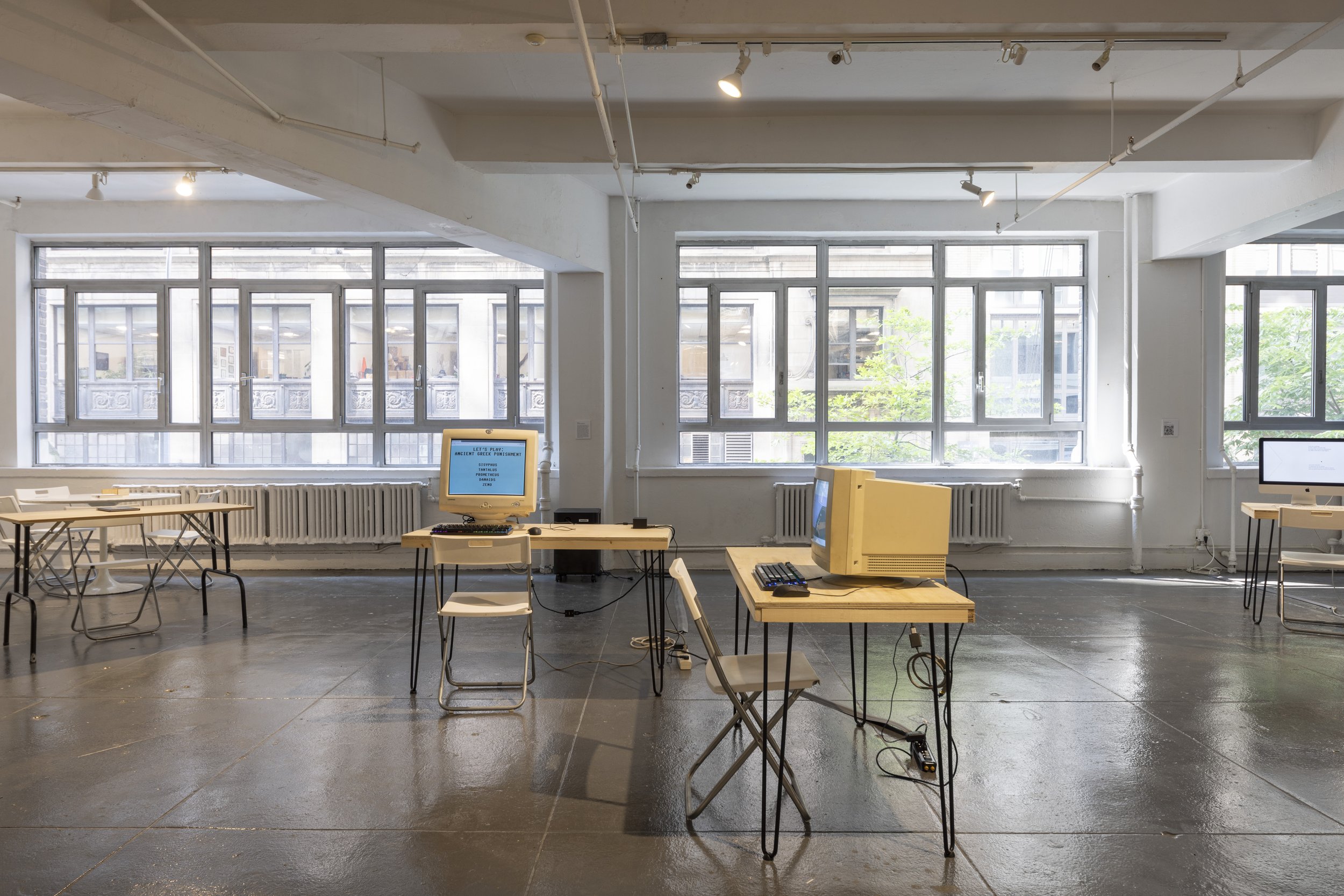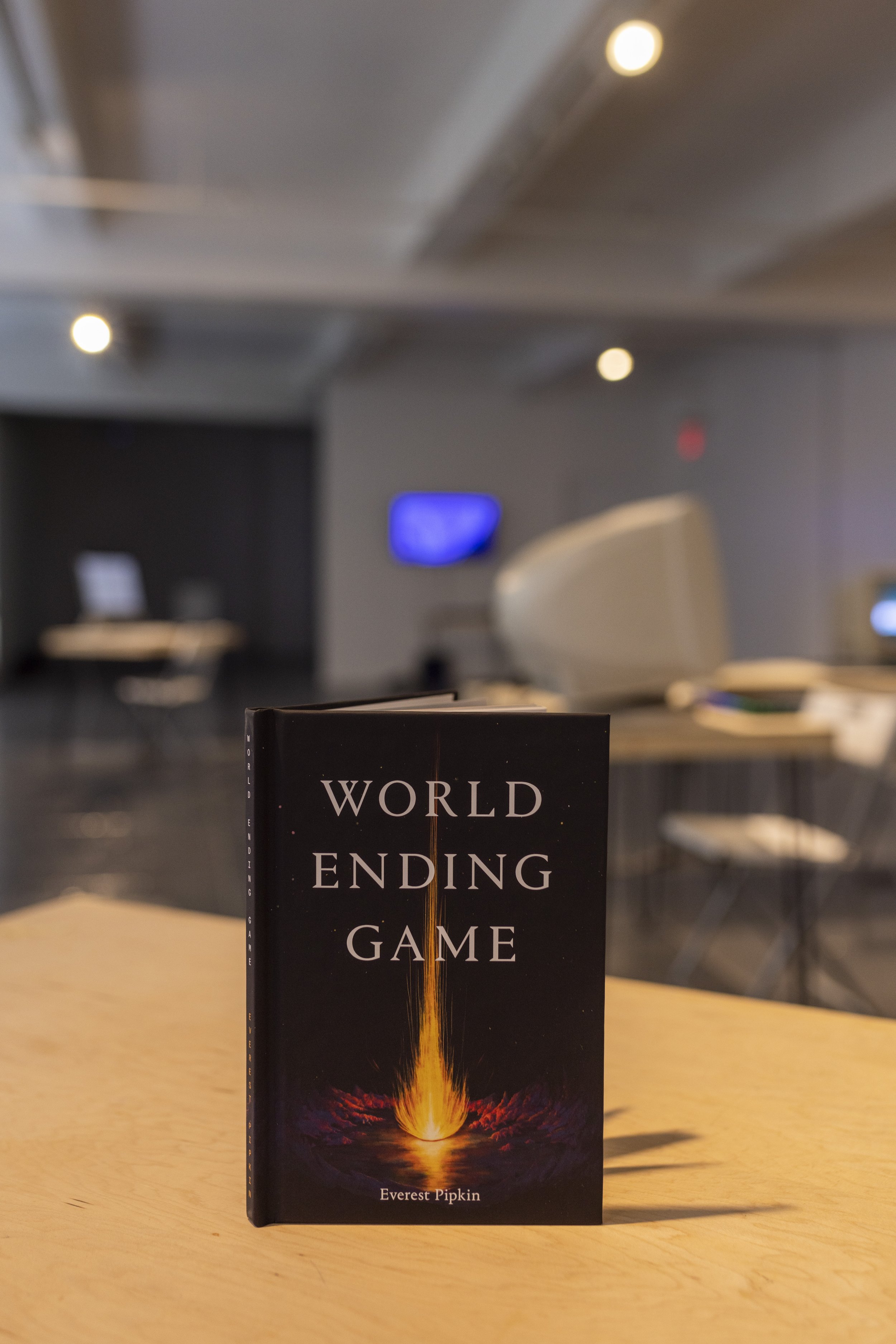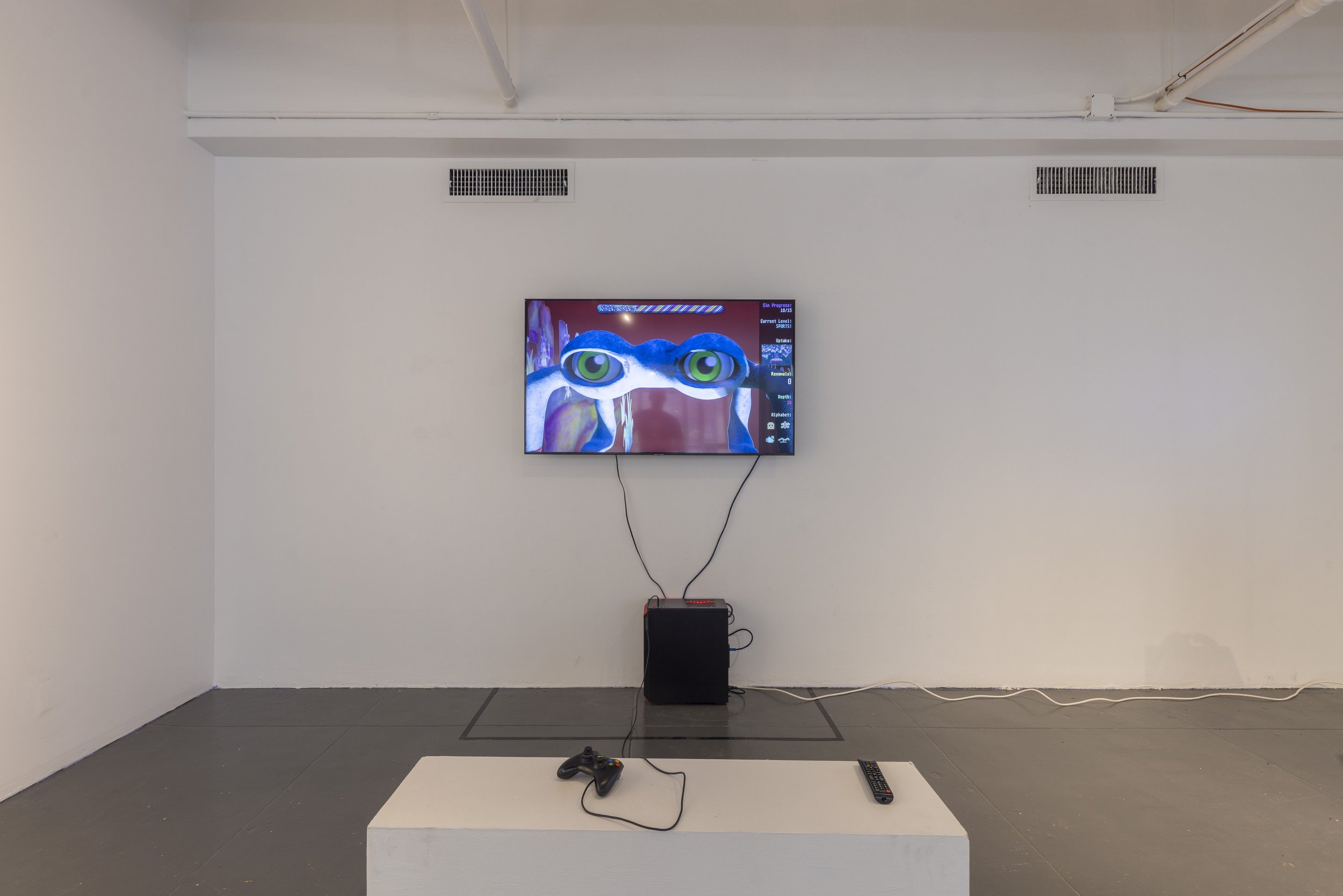Voluntary Attempts to Overcome Necessary Obstacles
September 23 – October 29, 2022
Curated by Nicholas O’Brien
Pippin Barr
Jeremy Couillard
Porpentine Charity Heartscape
Nathalie Lawhead
Everest Pipkin
The Escape From Woomera Collective
Studio Oleomingus
Angela Washko
Robert Yang
EFA Project Space presents Voluntary Attempts to Overcome Necessary Obstacles, a group exhibition of artists, designers, and developers exploring the boundaries of games as an artistic medium. This exhibition attempts to sidestep the reactionary debates of whether “games can be art “and instead highlights works that have already put an end to this question. By bringing these works together, curator Nicholas O’Brien points out how games are actively creating and supporting conversations about politics, society, history, and identity in nuanced poetic and critical ways.
The exhibition’s title is a riff on Bernard Suits’ definition of a game in his part fiction/part philosophical treatise The Grasshopper: Games, Life, and Utopia: “A game is voluntary attempt to overcome unnecessary obstacles.” O’Brien’s “play” on this definition suggests that contemporary games—particularly when viewed as cultural artifacts and not as instruments of entertainment media—can represent difficult cultural and social barriers facing our world today. In turn, players must commit themselves (voluntarily) to surmount these obstacles to move toward purposeful outcomes that speak to spaces, feelings, and relationships beyond the so-called “magic circle” of play.
However, one of the initial “obstacles” for the works on view in this exhibition is for them to be understood and appreciated on their own terms and not by the limited vernacular of “tech.” Game art has struggled for wider recognition within some contemporary art canons when it doesn’t conform to spectacle. Though artists using games have found several high-profile exhibition opportunities, presentations of those works often leverage the technical prowess of makers and their ability to craft complex systems using game engines. Though those works deserve merit, this exhibition presents an alternative to praising technical novelty in favor of celebrating the storytelling, critical introspection, and subversive graphical gestures that games can also offer.
The other important “obstacle” facing this medium is to not fall into the trap of appreciating games as merely pieces of entertainment media that allow for the “potential for empathy through immersion.” This proposition, initially posed by Jonathan Belman and Mary Flanigan around 2010, circulated widely through the games industry and couches “meaningful play” into an attempt at fully encapsulating complex personal/societal issues into reductive and easily consumable experiences. This premise resulted in countless threads of reactionary trolling, polemic rhetoric about “what games can do” (or what they ought to do), and institutional justifications for exhibiting (and collecting) games as designed objects.
Instead, Voluntary Attempts… wishes to present these pieces as artistic experiments and explorations that could (and should) be considered as equally poignant as other existing critiques happening elsewhere in contemporary art.
Just as artists in any other medium, many makers in this exhibition create work by pulling from their personal backgrounds. In Angela Washko’s Mother, Player the artist uses their recent biography of becoming a mother during the pandemic in a hand-drawn point and click adventure. For Studio Oleomingus, the duo unpacks family history of political oppression and incarceration in India as a labyrinthian isometric puzzle. Nathalie Lawhead’s experimental desktop pet is a therapeutic device the artist designed for talking through anxiety, an experience she made from personal necessity.
Other makers critically look around them and design experiences that reflect on political and social histories. Robert Yang’s The Tearoom is a “public bathroom simulator” that’s heavily inspired by Laud Humphrey sociological research in the 1970s regarding anonymous sex between men in public restrooms. But Yang’s creative spin on Humphrey’s research results in a game not only about, as he wrote, “gay history, but also a game about how video games think of sex and violence.” The Escape from Woomera Collective designed a modification (mod) to a popular competitive First-Person-Shooter game Counter Strike that situates the player in a refugee detention center in Woomera, Australia. The mod not only repurposes the politically tone-deaf content of its source, but also showed how games could present disenfranchised narratives from the perspective of a marginalized protagonist (a rarity in 2002 when the mod was shot down).
Where the projects mentioned previously reference social/political history or personal narrative, Pippin Barr and Jeremy Couillard take a more absurd approach. Barr’s suite of 2-bit, lo-fi, interactive artworks are “gamified” versions of classic Greek mythology. Barr’s Let’s Play Ancient Greek Punishment rejects mainstream game design conventions that encourage “obtainable goals” to situate the player in a “state of flow.” Instead, Barr’s work takes the morals (such as they are) from the tragedies of Zeno, Sisyphus, and Danadius and applies them to repetitive game play actions. Couillard’s considerably more psychedelic Fuzz Dungeon is also a romp through the woes of humans trying their best but forever falling short. The artist said the piece stemmed from how “we have these great ideas that we see perfectly in our heads, but when we go to get them out they are never what we originally intended and often look like monsters.”
At its core Voluntary Attempts… eschews the trendiness of tech (though some pieces in the exhibition play with photorealistic and hi-gloss simulation techniques) to champion introspective storytelling. All the artworks in the show contain elements that ask the player to reflect on the circumstances of the interactive experience, but Everest Pipkin and Charity Porpentine Heartscape do this in the technically humblest of ways: the written word. Pipkin’s collection of tabletop role playing games (TTRPGs) and Heartscape’s text-adventure Twine game The Soft Rumor of Spreading Weeds use language as the “engine,” demanding that players forgo the need for explicit graphical details. Instead, they invite the player to fill in those visual gaps with their own interpretations and participation, guided by lyrical and evocative prose.
Over the course of the exhibition programs led by O’Brien will continue conversations initiated by these works and attempt to bring new audiences to this medium. O’Brien invites audiences with no prior games/player experience to come celebrate and revel in these works and experience what games have to offer.
EVENTS
Friday, September 23, 5-8PM
Opening Reception
Friday, September 30, 7:30PM
TTRPG Twitch Stream w/ Everest Pipkin (online event)
Thursday, October 20, 6-8PM
Catalog Release/Panel Discussion (In conjunction with EFA Open Studios)
Robert Yang, The Tearoom, 2017. Video Game.
Angela Washko, Mother, Player: Demo, 2022. Video Game.
Studio Oleomingus, Folds of a Separation, 2022. Video Game.
Pippin Barr, Let’s Play Greek Punishment, 2011. Video Game, Custom Electronics, 400px x 800px.
Front Left: Everest Pipkin, World Ending Game, 2022. Printed book, 6.125 x 9.25 inches.
Back: Everest Pipkin, The Cloister, 2020. Printed book, 6 x 9 inches.
Front Right: Everest Pipkin, The Ground Itself, 2019. Printed book, 5 x 7 inches.
Front: Everest Pipkin, The Ground Itself, 2019. Printed book, 5 x 7 inches.
Back: Everest Pipkin, The Cloister, 2020. Printed book, 6 x 9 inches.
Everest Pipkin, World Ending Game, 2022. Printed book, 6.125 x 9.25 inches.
Everest Pipkin, The Cloister, 2020. Printed book, 6 x 9 inches.
Left to Right:
Jeremy Couillard, Fuzz Dungeon Map 02, 2021. C-print on aluminum, 24 x 16 inches.
Jeremy Couillard, Fuzz Dungeon Map 01, 2021. C-print on aluminum, 20 x 10 inches.
Jeremy Couillard, Fuzz Dungeon, 2021. Video Game.
Angela Washko, Mother, Player: Chapter 1 (Demo), 2022. Video Game.
Angela Washko, Mother, Player: A Reader, 2022. Artist book, 12 x 9 inches.
Angela Washko, Mother, Player: A Reader, 2022. Artist book, 12 x 9 inches.
Angela Washko, Mother, Player: Chapter 1 (Demo), 2022. Video Game.
Jeremy Couillard, Fuzz Dungeon, 2021. Video Game.
Left: Jeremy Couillard, Fuzz Dungeon Map 02. 2021. C-print on aluminum, 24 x 16 inches.
Right: Jeremy Couillard, Fuzz Dungeon Map 01, 2021. C-print on aluminum, 20 x 10 inches.
Left: The Escape From Woomera Collective, Escape from Woomera. 2003. Half-Life Mod, Video Game.
Right: Porpentine Charity Heartscape, The Soft Rumor of Spreading Weeds, 2019. Video Game / Interactive Fiction.
Porpentine Charity Heartscape, The Soft Rumor of Spreading Weeds, 2019. Video Game / Interactive Fiction.
Porpentine Charity Heartscape, The Soft Rumor of Spreading Weeds, 2019. Video Game / Interactive Fiction.
The Escape From Woomera Collective, Escape from Woomera, 2003. Half-Life Mod, Video Game.
Nathalie Lawhead, SHARED_ANXIETIES_WITH_A_FRIEND_ON_YOUR_BIRTHDAY.exe, 2019. Executable software, Desktop Pet.
Studio Oleomingus, Folds of a Separation, 2022. Video Game.
Robert Yang, The Tearoom, 2017. Video Game.
Robert Yang, The Tearoom, 2017. Video Game.


























